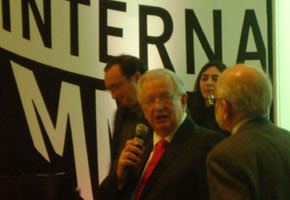

Carlos Humes Junior, a professor at the Universidade de São Paulo’s Mathematics and Statistics Institute and two post-graduate students will receive IBM research grants in Brazil for work in the areas of mathematics and computing.
Carlos Humes Junior, a professor at the Universidade de São Paulo’s Mathematics and Statistics Institute and two post-graduate students will receive IBM research grants in Brazil for work in the areas of mathematics and computing.
Carlos Humes Junior, a professor at the Universidade de São Paulo’s Mathematics and Statistics Institute and two post-graduate students will receive IBM research grants in Brazil for work in the areas of mathematics and computing.

Carlos Humes Junior, a professor at the Universidade de São Paulo’s Mathematics and Statistics Institute and two post-graduate students will receive IBM research grants in Brazil for work in the areas of mathematics and computing.
By Elton Alisson
Agência FAPESP – Carlos Humes Junior, a professor at the Department of Computer Science at the Universidade de São Paulo’s Mathematics and Statistics Institute (USP-MME) and two post-graduate students will receive IBM research grants in Brazil for work in the areas of mathematics and computing.
Humes Junior was among those chosen to receive the IBM Faculty Award 2011 for the project “Mathematical models for industry and services.” The recipients were announced at a ceremony held on October 5 in São Paulo.
Based on the studies that Humes Junior began in the early 1970s during his doctoral studies at the University of California, Berkeley, the project aims to apply mathematical models to optimize operations from computer networks and services industry systems, such as banks and call centers, for example.
“These questions were heavily studied in 1970s and gaining popularity again. We intend to continue conducting research in this area, using a little of my experience in applications on the theory optimization of computer networks and systems,” Humes Junior told Agência FAPESP.
Other recipients include Julio Cezar Silveira Jacques Junior, a Ph.D candidate in the post- Pontifícia Universidade Católica do Rio Grande do Sul’s Computer Science program, and Juliana Bezerra, Ph.D candidate at the Aeronautics Technical Institute’s Computer Science Division, who were chosen for the IBM Ph.D Fellowship Award 2011 for their research on “Human segmentation in fixed images” and “Self-organized virtual communities: response mechanisms to conflicts and motivation,” respectively.
According to IBM Brazil, the IBM Faculty Award annually recognizes professors of “renowned universities the world over that are active in creating the science and technology that make the world more intelligent.” The objective of the award is to stimulate collaboration between academia and industry in areas of strategic interest to IBM.
The selection process involves projects presented by hundreds of professors from the world’s best universities and receiving the award recognizes the probable impact of a chosen professor’s research, according to the company.
The IBM Ph.D Fellowship, on the other hand, is a scholarship focused on studies about questions that contribute to the solution of problems of the company’s interest and represent significant scientific contributions for computer science areas, electrical and material engineering, physical science, mathematics and services science.
The fellowships are granted annually to doctoral candidates with prominent scientific-academic activity worldwide, chosen through a highly competitive global selection process. The grants and fellowships were given during the first Technical-Scientific Colloquium held by the company in Brazil as part of the celebration of its 100th anniversary.
Promoted by the Brazilian laboratory of IBM’s local research division, the event was dedicated to the laboratory’s main research line – exploration of natural resources, particularly oil, gas, mineral resources and agriculture.
Republish
The Agency FAPESP licenses news via Creative Commons (CC-BY-NC-ND) so that they can be republished free of charge and in a simple way by other digital or printed vehicles. Agência FAPESP must be credited as the source of the content being republished and the name of the reporter (if any) must be attributed. Using the HMTL button below allows compliance with these rules, detailed in Digital Republishing Policy FAPESP.





